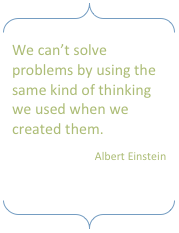Building Change Resilience - Be A Problem Solver
Be a problem solver
 How does being a problem solver build
resilience to change? Well... if you are a problem solver, you will see a challenge,
not as a problem but rather a situation waiting for the right solution! If you
see a picture of Mount Kilimanjaro do you think “Phew too big” or do you start
planning a route, finding guides and getting the right equipment? When you are
first presented with a change, you think what can I do differently and how can
we benefit from this?
How does being a problem solver build
resilience to change? Well... if you are a problem solver, you will see a challenge,
not as a problem but rather a situation waiting for the right solution! If you
see a picture of Mount Kilimanjaro do you think “Phew too big” or do you start
planning a route, finding guides and getting the right equipment? When you are
first presented with a change, you think what can I do differently and how can
we benefit from this?
Here are a few questions I ask myself
when presented with a challenge or a new situation:
What is the real issue?
Customers asked for longer branch
opening hours because they wanted easier access to their cash 24 hours a day.
So the preferred solution to the issue, was not for branches to stay open until
11pm but to install an ATM.
Who knows more than me about this issue?
Use lessons learnt or simply ask an SME,
colleague or friend for support when trying to solve the problem. Don’t forget
your line manger or team lead as a source of knowledge and wisdom. Everybody
has a different perspective and set of skills that could help you see the
situation from a different light.
What’s in it for the customer or for me?
If this question is not answered, very
often the challenge may remain unresolved. There is far more willingness to
address a problem if there is something to gain at the outcome.
Do I need to reinvent the wheel?
Sometimes small changes lead to big
changes in behaviour. In the UK, getting authorisation from organ donors was a
huge challenge until someone had the bright idea to add a simple check box to
the driver license application/renewal forms. In less than 6 months, the
hospitals saw an increase of 40% of willing donors.
Are the barriers a false assumption?
Assumptions help us to narrow down the
focus of a problem but sometimes we can base our assumptions on false
information or prejudices. Assumptions should be based on scientific fact,
rather than what we think we know. It helps to write your assumptions down and
examine each one individually.
Knowing how to solve problems is key to
reinforcing resilience to change because it means that you have a flexible
approach to every new situation. A
good problem solver is creative in their approach and is a good listener. You also
has to think differently because if all the other applied solutions have not
worked, this is where thinking out of the box will really earn you kudo’s and
save you and your team a lot of time and stress
Let’s solve the problems by thinking differently
Blogs
Good Reads
‘Blink’ and ‘The Outliers’ - by
Malcom Gladwell
‘The Mind of a Fox’
– by Chantell Ilbury & Clem Sunter
Share your story about how you approach problems
and how you would use this to solve problems.

Hi
ReplyDeleteHi Joan
ReplyDeleteLove the blog
Regards
Rothwell cAmpher
Hello
ReplyDeleteEnjoyed the workshop.
Thannks Rothwell and anonymous.
ReplyDelete